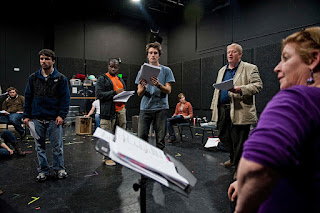Statement to the Playwright's Studio and Scottish Society of Playwrights 12th June 2020
Whisper it. You see that “New Normal” everyone keeps talking
about being just round the corner? This
might be it. It might already be here. The Titanic may already have hit the
iceberg.
I have to face the fact that my current commission…which I
feel very lucky to have, by the way…might be for a cast of eight to ten actors
who will NEVER perform the play in front of a full, live audience. They might
have to tell the story on a studio set for the cameras, sitting and standing at
least six feet apart from one another.
Now I can do that. I might even get quite excited, artistically,
by the prospect of something like that. But who the hell is going to pay for
it? How much will they pay for a socially distanced evening in a one fifth full
theatre where they get their temperature checked before they go in. £80. £120? Seriously?
As an individual, like everyone else, I have no way of
knowing anything. But as a small cog in the collective “business” of Scottish
theatre, I know this much : that if our sector needs collective, strategic
support to get through this, then we are going to have to earn it by being
strategic and collective ourselves.
The pandemic and the economic crisis which is going to
follow it mean that the time has come to ask to whom the public space of our
theatres actually belongs. The time has come to look again at the model of
1947, where public funding was extended to the boards of already existing charitable
trusts to administer those spaces on the public’s behalf. I’m sure that all of us here and everyone
involved with those institutions wants live performance to be part of a
sustained societal effort to revive the educational, retail, tourism, health
and leisure sectors of our economy and culture...but do we really think we do
that simply by restoring the status quo ante viro? Do we really think that keeping things
exactly as they were is a sufficient offer to make the political case for
ourselves as a public good?
There have already been instances of new thinking ; that
artists should be individually supported at different stages of their careers
by an expanded system of residencies and bursaries ; that regional hubs become the default funding
and managerial base for arts activities in different geographical areas; that a
properly funded touring network with an annual festival to select and fund
tours of existing projects be founded in order to lead an expansion and
extension of performance and participation with a specific focus on locales of
social deprivation and geographical (and social) isolation; that an integrated
arts strategy work in tandem with the health service, the education service,
services for people with physical or learning disabilities, social services for
the elderly and other special needs groups.
There is no shortage of ideas, but I don’t think we can really deliver ANY
good ideas while clinging to the burnt out shell of our currently bankrupt
institutions. If we die in the ditch to
defend the management structures through which and often despite of which we
have been TRYING to do good, then I respectfully suggest we’re dying in the
wrong ditch.
Let’s be honest. Twelve weeks ago the system was already
broken. Half of the cultural spend in Scotland was through untouchable National
Companies while the other half was more or less a free for all application form
competition. This was already inefficient and corrupting and has been cruelly
exposed by the pandemic and its aftermath as absurd.
I don’t think theatre as such lacks for future potential…if
we think about our sector as public, shared space. But, as we know, individual
theatres and theatre companies are in a whole heap of trouble. The response to
troubled times has to be sector wide and strategic. Sitting back and waiting for audiences and
governments and the buyers of lottery tickets to bail us out with no questions
asked, as if we were bankers or something, is strategically inept and morally
repugnant. I am not advocating a cull of our institutions, but I do think the
times demand that those institutions get smart and get organised.
If we are to make a “New Deal” for theatre in Scotland it
has to be as a shared public service geared towards specific, and necessarily
political ends. And if that means ending the hypocrisy of unaccountable and
chaotic “arms-length” funding, then
that might be no bad thing. We are
either part of the solution, part of an integrated new vision of community, reinventing
what the Arts Councils did in 1947, refreshing the return to life…or we are part
of the problem…and we can put our heads between our legs and kiss our ass
goodbye. Nobody will miss us.



Comments
Post a Comment